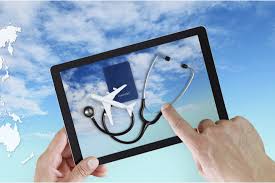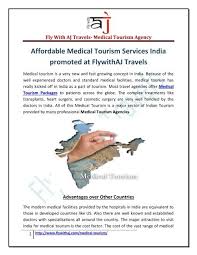
Exploring Top Global Medical Tourism Destinations
Exploring Top Medical Tourism Destinations
Medical tourism has become a popular trend for individuals seeking high-quality healthcare services at affordable prices. With advancements in medical technology and the rise of global travel, patients now have access to a wide range of top medical tourism destinations around the world.
Thailand: Land of Smiles and Superior Healthcare
Thailand is renowned for its world-class medical facilities, highly trained healthcare professionals, and affordable treatment options. From cosmetic surgery to complex medical procedures, Thailand offers a diverse range of healthcare services that attract patients from around the globe.
India: A Hub for Advanced Medical Treatments
India has emerged as a leading destination for medical tourists seeking specialized treatments such as cardiac surgery, organ transplants, and cancer care. With state-of-the-art hospitals and renowned specialists, India provides exceptional healthcare services at competitive prices.
Mexico: Quality Care in Proximity
Mexico is a popular choice for medical tourists from North America seeking quality healthcare just a short flight away. With modern medical facilities, English-speaking staff, and cost-effective treatments, Mexico offers convenience and affordability without compromising on quality.
Singapore: The Epitome of Healthcare Excellence
Singapore is known for its cutting-edge medical technology, rigorous safety standards, and world-class healthcare infrastructure. Patients visiting Singapore can expect top-notch medical care in a clean and efficient environment, making it a preferred destination for complex procedures and specialized treatments.
Brazil: Combining Beauty with Healthcare Expertise
Brazil is not only famous for its natural beauty but also for its expertise in cosmetic surgery and aesthetic procedures. With skilled plastic surgeons and luxurious recovery facilities, Brazil attracts patients looking to enhance their appearance while receiving top-quality medical care.
In conclusion, these top medical tourism destinations offer patients the opportunity to receive high-quality healthcare services in diverse settings around the world. Whether seeking specialized treatments or cost-effective procedures, these destinations cater to the needs of medical tourists with excellence and professionalism.
Exploring the Benefits of Medical Tourism: Affordable, World-Class Care and Cultural Adventures
- Access to world-class healthcare facilities
- Cost-effective treatment options compared to domestic services
- Availability of specialized treatments not offered locally
- Opportunity to combine medical care with travel and leisure
- Exposure to international medical expertise and advanced technologies
- Reduced waiting times for consultations and procedures
- Personalized care and attention from healthcare professionals
- Cultural immersion and exploration in a foreign destination
7 Drawbacks of Medical Tourism: Navigating Language Barriers, Legal Risks, and Hidden Costs
- Language barriers may hinder effective communication between patients and healthcare providers.
- Different healthcare standards and practices in foreign countries can lead to misunderstandings or dissatisfaction with treatment.
- Long travel distances may result in discomfort, jet lag, or increased risk of complications post-treatment.
- Cultural differences can impact the overall patient experience, including dietary restrictions and medical etiquette.
- Limited legal recourse in case of malpractice or unsatisfactory outcomes in a foreign country.
- Lack of continuity in follow-up care after returning home from the medical tourism destination.
- Potential for hidden costs such as additional medical procedures, travel expenses, or unforeseen complications.
Access to world-class healthcare facilities
Medical tourism destinations provide patients with access to world-class healthcare facilities equipped with state-of-the-art technology and renowned medical professionals. These facilities offer cutting-edge treatments, advanced procedures, and specialized care that may not be readily available in their home countries. Patients can benefit from the expertise of highly skilled healthcare providers and the latest medical innovations, ensuring that they receive top-quality care and optimal outcomes for their health needs. The availability of world-class healthcare facilities in medical tourism destinations enhances the overall patient experience and contributes to the success of their treatment journey.
Cost-effective treatment options compared to domestic services
One significant advantage of medical tourism destinations is the cost-effectiveness of treatment options compared to domestic services. Patients can often save a substantial amount of money by seeking medical care abroad, as many countries offer high-quality healthcare services at a fraction of the cost found in their home countries. This affordability allows individuals to access necessary treatments, procedures, and surgeries that may otherwise be financially out of reach, making medical tourism a viable and attractive option for those seeking quality care without breaking the bank.
Availability of specialized treatments not offered locally
Medical tourism destinations provide a valuable advantage by offering access to specialized treatments that may not be available locally. Patients seeking specific medical procedures or advanced treatments that are not offered in their home country can benefit from traveling to renowned healthcare facilities abroad. These destinations attract individuals in need of specialized care, ensuring they receive the latest medical advancements and expertise that may not be accessible in their own region. This pro of medical tourism destination underscores the importance of expanding treatment options and providing patients with opportunities to access cutting-edge healthcare services beyond their local limitations.
Opportunity to combine medical care with travel and leisure
Medical tourism destinations offer a unique advantage by providing patients with the opportunity to combine essential medical care with travel and leisure experiences. This pro allows individuals to not only focus on their health and well-being but also explore new destinations, cultures, and attractions during their recovery period. By blending medical treatments with travel adventures, patients can turn their healing journey into a fulfilling and enriching experience that promotes both physical recovery and mental rejuvenation.
Exposure to international medical expertise and advanced technologies
Medical tourism destinations provide patients with a valuable pro of exposure to international medical expertise and advanced technologies. By seeking healthcare services abroad, individuals have the opportunity to access top-tier specialists and cutting-edge medical facilities that may not be available in their home countries. This exposure allows patients to benefit from the latest advancements in healthcare technology, innovative treatment options, and specialized medical knowledge that can contribute to improved health outcomes and a higher quality of care.
Reduced waiting times for consultations and procedures
One significant advantage of medical tourism destinations is the reduced waiting times for consultations and procedures. In many countries, healthcare systems face long waiting lists due to high demand and limited resources. Medical tourists can benefit from expedited access to medical experts and treatments in destinations known for their efficient healthcare services. By avoiding lengthy wait times, patients can receive timely consultations and undergo necessary procedures without delays, allowing them to address their health concerns promptly and efficiently.
Personalized care and attention from healthcare professionals
Medical tourism destinations offer a significant pro in the form of personalized care and attention from healthcare professionals. Patients traveling abroad for medical treatment often experience a level of individualized care that goes above and beyond traditional healthcare settings. From detailed consultations to tailored treatment plans, healthcare professionals in medical tourism destinations prioritize the specific needs and preferences of each patient, ensuring a holistic and personalized approach to their medical care. This personalized attention not only enhances the overall patient experience but also contributes to better health outcomes and patient satisfaction.
Cultural immersion and exploration in a foreign destination
One significant advantage of medical tourism destinations is the opportunity for cultural immersion and exploration in a foreign destination. Patients not only receive top-quality healthcare but also have the chance to experience a new culture, cuisine, and way of life. By traveling to a different country for medical treatment, individuals can broaden their horizons, learn about local traditions, and interact with people from diverse backgrounds. This cultural exchange can enrich the overall healing experience and create lasting memories beyond just medical care.
Language barriers may hinder effective communication between patients and healthcare providers.
Language barriers present a significant con in medical tourism destinations as they can impede effective communication between patients and healthcare providers. Misunderstandings due to language differences may lead to errors in diagnosis, treatment, or post-operative care, potentially compromising the quality of healthcare received by the patient. Inadequate communication can also result in confusion, anxiety, and dissatisfaction for both parties involved, highlighting the importance of language support services and cultural sensitivity in ensuring a positive and safe healthcare experience for medical tourists.
Different healthcare standards and practices in foreign countries can lead to misunderstandings or dissatisfaction with treatment.
One significant drawback of medical tourism destinations is the variance in healthcare standards and practices across different countries, which can potentially result in misunderstandings or dissatisfaction with treatment. Patients may encounter differences in medical protocols, quality of care, or communication practices that deviate from what they are accustomed to in their home country. These discrepancies can lead to challenges in receiving the expected level of care, understanding treatment options, or effectively communicating with healthcare providers, ultimately impacting the overall patient experience and outcomes.
Long travel distances may result in discomfort, jet lag, or increased risk of complications post-treatment.
One significant drawback of medical tourism destinations is the long travel distances involved, which can lead to discomfort, jet lag, and increased risks of complications post-treatment. Traveling long distances for medical care may exacerbate existing health conditions or cause additional stress on the body. Jet lag from crossing multiple time zones can disrupt the recovery process and affect the overall well-being of patients. Furthermore, extended travel times increase the likelihood of developing blood clots or other complications that may impact the success of medical procedures and recovery outcomes.
Cultural differences can impact the overall patient experience, including dietary restrictions and medical etiquette.
Cultural differences in medical tourism destinations can present challenges that impact the overall patient experience. Variances in dietary restrictions and medical etiquette between patients and healthcare providers can lead to misunderstandings and discomfort during treatment. Patients may find it challenging to navigate unfamiliar cultural norms related to food choices or communication styles, affecting their comfort and confidence in the healthcare setting. It is essential for both patients and healthcare professionals to be aware of and sensitive to these cultural differences to ensure a positive and effective medical tourism experience.
Limited legal recourse in case of malpractice or unsatisfactory outcomes in a foreign country.
One significant drawback of medical tourism destinations is the limited legal recourse available to patients in the event of malpractice or unsatisfactory outcomes in a foreign country. Due to differences in legal systems, language barriers, and unfamiliarity with local regulations, patients may face challenges in seeking compensation or holding healthcare providers accountable for negligence. This lack of legal protection can leave patients vulnerable and without proper recourse in case of medical errors or unfavorable treatment results, highlighting the importance of thorough research and consideration before embarking on a medical tourism journey.
Lack of continuity in follow-up care after returning home from the medical tourism destination.
One significant drawback of medical tourism destinations is the lack of continuity in follow-up care once patients return home. After undergoing medical procedures abroad, patients may face challenges in receiving consistent post-operative care and monitoring from their local healthcare providers. This discontinuity can lead to gaps in treatment, delayed intervention for complications, and difficulties in managing recovery effectively. Without proper follow-up care, patients may experience increased stress and uncertainty about their health status, highlighting the importance of establishing seamless communication and coordination between international healthcare providers and local physicians to ensure comprehensive post-treatment support.
Potential for hidden costs such as additional medical procedures, travel expenses, or unforeseen complications.
One significant drawback of medical tourism destinations is the potential for hidden costs that patients may not anticipate. Beyond the initial treatment expenses, there is a risk of incurring additional charges for supplementary medical procedures, travel-related costs, or unforeseen complications that may arise during or after treatment. These hidden costs can significantly impact the overall affordability and financial planning of seeking healthcare abroad, potentially leading to unexpected financial burdens for patients seeking medical care in foreign countries. It is crucial for individuals considering medical tourism to thoroughly research and understand all potential expenses involved to make informed decisions about their healthcare journey.



